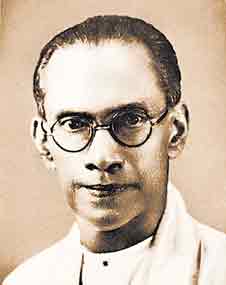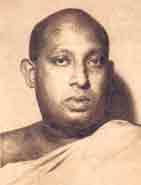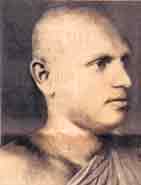A Prime Minister's assassination trial
 |
| S. W. R. D. Bandaranaike |
The assassination of a Prime Minister of a country brings a shock to the entire nation. It was no different when Prime Minister S. W. R. D. Bandaranaike was gunned down around 9.45 in the morning on September 25, 1959. He succumbed to his injuries the next day.
The Bandaranaike assassination trial began on February 22, 1961 before Justice T. S. Fernando, Queen's Counsel and a special jury. The case was concluded on May 12, 1961 when a unanimous verdict of the jury found Talduwe Somarama, a Buddhist monk attached to the College of Ayurveda, guilty of murder.
He was sentenced to death. The appeal was dismissed and the sentence was confirmed first by the Court of Criminal Appeal of Sri Lanka (then Ceylon) and later by the Judicial Committee of the Privy Council, UK. Somarama was hanged later that year by which time he had been converted to Christianity and baptized as Peter by Rev. Mathew Peiris.
Having registered a landslide victory in April 1956, Prime Minister Bandaranaike who was dubbed 'the people's Prime Minister' had always kept the gates of his Rosmead Place residence wide open. Anyone could just walk in and meet him. There would be a fair crowd to see him every morning. On that fateful morning too, it was in front of around forty people that he was shot at.
Five accused faced trial for the murder of the Prime Minter. They were:
1. Mapitigama Buddhrakkita Thera, chief incumbent of the Kelaniya temple.
2. H. P. Jayawardena, a printing press owner and a close associate of Buddharakkita Thero.
3. Anura de Silva, a motor mechanic and electrician
4. Talduwe Somarama Thera.
5. Newton Perera, a police inspector.
All five were charged with conspiracy to murder, with Somarama the additional charge of committing murder.
The seven-man jury comprised of
D. W. L. Lieversz (Foreman),
J. A. Bocks,
D. J. C. Fernando,
G. B. L. Jayaratne,
S. Ratnam,
T. E. Jansz & L. D. G. de Silva.
After the addresses of the counsel, the judge began his charge to the jury on May 5. The lengthy summing-up went to 458 pages of typescript.
At the end of the judge's statement, the jury deliberated for over three hours and in a hushed and tense atmosphere informed the judge that they had unanimously agreed on the verdict of Buddharakkita, Jayawardena, Somarama and Anura de Silva but was divided about Newton Perera. They found Buddharakkita, Jayawardena & Somarama guilty on the charges of conspiracy and Somarama also on the count of murder. While they unanimously found Anura not guilty, the jury found Newton not guilty by a majority verdict of five to two.
 |
 |
Buddharakkita
Thera – first accused |
Somarama – convicted for murder |
The three convicts were sentenced to death. However, the sentences of death imposed on Buddharakkita and Jayawardena were changed to rigorous imprisonment for life after submissions in the Court of Appeal.
Buddharakkita died in prison while Jayawardena continued to serve his sentence till August 4, 1977. The sentence of life imprisonment imposed on him was commuted to a term of 20 years by the Governor-General acting on the advice of the Minister of Justice on May 7, 1966.
Justice A. C. Alles who, in 1979 authored a book on the Bandaranaike Assassination in his series 'Famous Criminal Cases of Sri Lanka,' describes the trial as "the most notable trial held in Sri Lanka up to date and a case that will go down in the annals of famous criminal cases of Sri Lanka as being perhaps the most important, the most dramatic and the most complex crimes of our times." |



